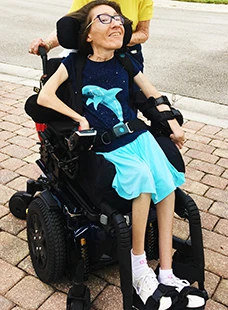

In the midst of the COVID crisis, Therese’s bureaucratic nightmare with her Medicaid Long-Term Care managed care plan (“the plan”) entered a new chapter. To recap: Therese is a quadriplegic. Her airway must be suctioned whenever she eats or drinks, she is on a respirator for 12-13 hours /day and sometimes longer. In short, she needs round-the-clock care. Therese has the option to “hire” her own providers as part of the plan’s Participant Directed Care Program. Under this program, Therese’s sister, Kathleen, who is an RN, has a contract with the plan to be paid for 40/hours/week of skilled nursing care. Kathleen gave up her job in order to do so, and she provides Therese with 24/7 care.
Therese first shared her story with the Health Justice Stories Project in July 2019, after her Medicaid eligibility had been erroneously terminated, for the second time. This was an obvious and grievous error as neither her health nor her financial circumstances had changed. After Therese’s coverage was finally reinstated after significant advocacy, we thought coverage issues going forward had been resolved.
And Therese, in spite of her profound physical challenges said, “I feel blessed. I have my sister here to take care of me.” But these two articulate and resourceful sisters are worried–and not just about themselves.
But now, in the midst of the COVID crisis, Therese is in a new bureaucratic nightmare. The plan told the sisters they needed to get a new prescription with a “clinical diagnosis to support 40 hours a week of skilled nursing care.” Back and forth the prescription went between the health plan and Therese’s doctor, who dutifully supplied all of the requested information, each time it was requested. Still, Kathleen stopped getting paid at the end of March. When Therese called the plan, desperate to fix the problem, she got confusing and conflicting information. For example, on April 6, the plan incorrectly said the Rx needed to be filed with Medicare. The plan corrected their mistake but on April 14, told Therese they never received it.
On April 17, after not receiving RN wages for over three weeks, Kathleen told the Health Justice Stories Project, “We’re a close and loving family. Of course, I’m not going to let my sister Therese die or go into a nursing home; but we need my skilled nursing wages to pay the bills.”
And Therese, in spite of her profound physical challenges said, “ I feel blessed. I have my sister here to take care of me.” But these two articulate and resourceful sisters are worried–and not just about themselves. Together they wonder how other people who are so severely disabled, including those who also have dementia, can survive these bureaucratic nightmares. ”I’m very troubled about what people are going through who do not have family with the skills to take care of them,” Kathleen asked. “Are they just dying?”
In the midst of the COVID crisis, Therese’s bureaucratic nightmare with her Medicaid Long-Term Care managed care plan (“the plan”) entered a new chapter. To recap: Therese is a quadriplegic. Her airway must be suctioned whenever she eats or drinks, she is on a respirator for 12-13 hours /day and sometimes longer. In short, she needs round-the-clock care. Therese has the option to “hire” her own providers as part of the plan’s Participant Directed Care Program. Under this program, Therese’s sister, Kathleen, who is an RN, has a contract with the plan to be paid for 40/hours/week of skilled nursing care. Kathleen gave up her job in order to do so, and she provides Therese with 24/7 care.
Therese first shared her story with the Health Justice Stories Project in July 2019, after her Medicaid eligibility had been erroneously terminated, for the second time. This was an obvious and grievous error as neither her health nor her financial circumstances had changed. After Therese’s coverage was finally reinstated after significant advocacy, we thought coverage issues going forward had been resolved.
And Therese, in spite of her profound physical challenges said, “I feel blessed. I have my sister here to take care of me.” But these two articulate and resourceful sisters are worried–and not just about themselves.
But now, in the midst of the COVID crisis, Therese is in a new bureaucratic nightmare. The plan told the sisters they needed to get a new prescription with a “clinical diagnosis to support 40 hours a week of skilled nursing care.” Back and forth the prescription went between the health plan and Therese’s doctor, who dutifully supplied all of the requested information, each time it was requested. Still, Kathleen stopped getting paid at the end of March. When Therese called the plan, desperate to fix the problem, she got confusing and conflicting information. For example, on April 6, the plan incorrectly said the Rx needed to be filed with Medicare. The plan corrected their mistake but on April 14, told Therese they never received it.
On April 17, after not receiving RN wages for over three weeks, Kathleen told the Health Justice Stories Project, “We’re a close and loving family. Of course, I’m not going to let my sister Therese die or go into a nursing home; but we need my skilled nursing wages to pay the bills.”
And Therese, in spite of her profound physical challenges said, “ I feel blessed. I have my sister here to take care of me.” But these two articulate and resourceful sisters are worried–and not just about themselves. Together they wonder how other people who are so severely disabled, including those who also have dementia, can survive these bureaucratic nightmares. ”I’m very troubled about what people are going through who do not have family with the skills to take care of them,” Kathleen asked. “Are they just dying?”

